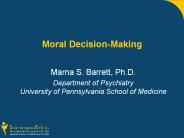Moral Priciples - PowerPoint PPT Presentation
1 / 8
Title: Moral Priciples
1
Moral Priciples
2
DOUBLE EFFECT
- Often used in the analysis of the moral
- aspect of controversial human acts
- Commonly called upon to evaluate medico-
- moral problems
- Also known as the voluntary indirect principle
- Important Terms to Remember
- Finis operantis - purpose or intention of the
agent. - Finis operis - the purpose of the action.
3
4 Conditions of Double Effect
- The action itself must be morally good or at
least indifferent - The good effect must precede the evil effect or
at least be simultaneous with it. - The intention of the agent should be directed
towards the good effect, never to the evil
effect. - Proportionality the good effect must be more
important than or at least equal to the bad
effect.
4
TOTALITY
- it rests on the proposition that the whole is
more important than its parts.
5
EPIKEA
- also known as epikia or epiky
- an interpretation of the human law not according
to its letter but according to its spirit for the
border cases which have not sufficiently been
taken into consideration by positive law. - St. Thomas - regards epikeia as a virtue, the
daughter of prudence and equity. - Bernard Haring 1985 - points out that epiky
inclines one to accept the burden and strain
beyond the letter of the law if its intent and
purpose and the common good demands it, as to
hold oneself free from onus.
6
CONDITIONS AND CAUTIONS TO BE OBSERVED -Epikea
- 1. as discussed, it only applies to positive
laws. - 2. the hardships and disadvantages resulting
from the fulfillment of the law must be
unproportionately great and must outweigh the
benefits to be hoped for after compliance with
it. - 3. Consultation is encourage, individuals can
easily deceived themselves as to the validity of
their reasons. - 4. recourse to a superior is required if
necessary. - 5. it cannot be applied to laws that void
acts or laws that render persons incapable of
undertaking certain legal actions.
7
MORAL MAXIMS
- There are the eternal, immutable laws of good
and evil to which the Creator Himself in all His
dispensations, conforms and which He has enabled
human nature to discover, so far as they are
necessary for the conduct of human actions. -
-Blackstone
8
continued
- one who acts through an agent is himself/herself
responsible - no one is obliged to betray himself
- himself/herself in doubt, one may do what is
generally done - an object cries out for its owner
- no one can give what he/she does not have
- the end does not justify the means
- no one is judge in his/her own case
- accessories belong to the principal object
- If one is willing to cooperate in an act, no
injustice is done - Laws imposing an obligation may given as narrow
an interpretation as possible.






























